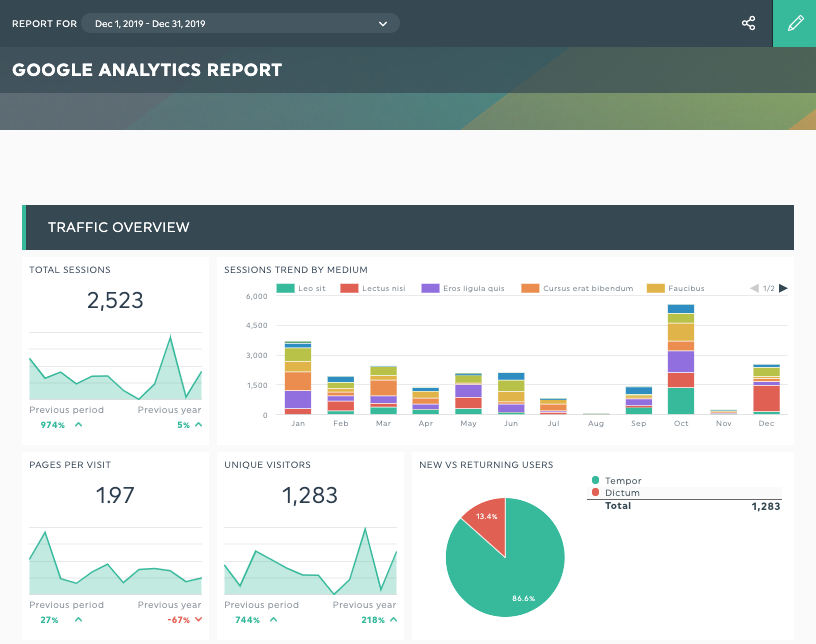3 Best Ecommerce Website Analysis Report You Should Use

Nowadays, Ecommerce is really the name of the game. If you don't have an ecommerce website or online store to sell your products, you should create one right now!
Not only is this a great way to sell to a larger audience, but you are also able to gain valuable data about which products interest them, which ad was the more successful, which search engine they used, and way more information about your audience's interests and behavior.
And to track your ecommerce site's metrics (like conversion rate, customer retention, checkout data, etc...) you need an all-in-one analytics report like the ones DashThis got for you!
See this report template live | Use it with your own data!
- What is an Ecommerce website analysis report?
- How to create an ecommerce report templates
- - Google Analytics Report Template
- - Email Marketing Report Template
- A complete ecommerce website analysis report
- Why use ecommerce report templates?
What is an ecommerce website analysis report?
An Ecommerce website analysis report is a tool with many functionalities that helps you learn what is going on in your ecommerce site and how to improve your user experience in order to gain new customers, and improve the conversion rate of your e-commerce store.
You can track your online store's ecommerce analytics with multiple different reports, a Google Analytics report, an ecommerce report, an email campaign report, and much more.
An ecommerce website analysis report shows all the KPIs you need for optimizing your online store's performance.
How to create an ecommerce report templates
To get you started, you can use a preset ecommerce report template already pre-filled with all the most useful KPIs.
Our preset templates are very easy-to-use, they help save you hours of work, and they are fully customizable, you can add, modify or delete KPIs, drag-and-drop them as you go, and add as many marketing platforms in the same report as you wish.
Here are some ecommerce reports you can use for your ecommerce analytics.
1. Google Analytics Report Template
With a Google Analytics report template, you can gather all your data from Google Analytics but also cross-examine this data along with Google AdWords, Google Search Console, and more.
You can gain useful insight about your different product pages, landing pages, referral traffic, website traffic, customer journey and shopping behaviors, and other takeaways that can help you improve the shopping experience of your users.
By tracking your Google Analytics KPIs and key metrics, you’ll get a better insight to help you to identify how to improve your current campaigns, how to increase conversions, and how to improve your website performance.

See this dashboard example live or use it with your own data.
The KPIs that you should include in a Google Analytics report for ecommerce are:
- Bounce rate
- Users
- New users
- Sessions
- New versus returning users
- Session duration
- Page per session
- Pageviews
- Top landing pages
- Top product pages
2. Ecommerce Report Template
As your online store continues to release new services or products, your ecommerce business marketing strategy is going to evolve continually.
Using an ecommerce report template will help you ensure that you have easy access to all of the essential KPIs so that you can take advantage of unique opportunities as they arise.
With this report you can have all the necessary information about your checkout process and shopping cart data, sales funnels, best-selling products, ecommerce conversion rate, product performance, and more from multiple marketing channels such as Google Analytics, Google Ads, you can even add data from your Shopify account, SEO, social media channels, and more with CSV files and multiple native integrations.
See this dashboard example live or use it with your own data.
Here are some KPIs and metrics you should include in your Ecommerce marketing dashboard:
- Total revenue
- Conversion rate
- Total number of transaction
- Bounce rate
- Pages per sessions
- Number of transactions
- Average order value (AOV)
- Customer lifetime value
- Existing customer and repeat customers
3. Email Marketing Report Template
Email marketing is one of the many ways you are reaching your audience and is one of the many traffic sources you bring to your ecommerce website.
Track how your campaigns attributions are working with an easy-to-use email marketing report template.

See this dashboard example live or use it with your own data.
You can track all the tools you use for email marketing such as Campaign Monitor, MailChimp, and Google Analytics, and collect the following data in your email marketing report:
A complete ecommerce website analysis report
You can have one report for SEO, another for Google Analytics, and another for email marketing, but you can also go ahead and create one overview report including all the data you need to track your ecommerce business.
All your digital marketing campaigns, all your analytics tools, and more, can be added to the same ecommerce performance report.
You can add all your Google Analytics accounts, site search data, every single KPI you want:
Why use ecommerce report templates?
Having the opportunity to have all this data already organized for you can help you to save both time and money.
By using an automated reporting tool like DashThis, you’ll get access to all of the above-listed marketing report templates, filled with all the most popular KPIs as nice-looking widgets with graphs, lists, pie charts, and more.
Gather all your marketing insights into one marketing performance dashboard, or create a different marketing dashboard for each of your digital marketing efforts.
Either way, DashThis has a dashboard template for you and can help you customize them exactly as you want them to be.
Try these report templates with your own data!
Ready to automate your ecommerce report?
Read More
Don’t miss out!
Automate your reports!
Bring all your marketing data into one automated report.
Try dashthis for free



